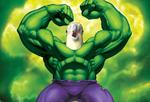ESPN put out this article today: https://www.espn.com/nba/story/_/id/...-sneaker-chase
The author, Nick DePaula, goes into a lot of detail into the surrounding aspects of the Zion/Jordan brand deal, including giving some insight into when we might expect a signature shoe to come into the limelight. Here's some excerpts:
First all, Sonny Vaccaro was Zion's adviser for his signature deal process: Vaccaro was the man who pushed Nike to sign Jordan back in the 80s. So that's a link to Jordan, and also shows you how seriously this process was taken.
Puma made a big offer, and were confident that they were going to win the bidding:
''they offered him an impressive financial commitment: a deal that soared as high as $15 million per year, plus the potential to add an additional $3 million a year in bonuses, according to industry sources.''
''"We were talking about the New York Knicks," Vaccaro said. "I said, 'You have to understand, they are pathetic. More than pathetic. There's only one thing that's constant -- everybody knows who they are.'''' This quote comes kind of out of the blue, not very relevant, but very funny.
Adidas got cold feet, and didn't commit the way they had implied they would:
''In a case of history repeating itself, the seriousness of Adidas' commitment to Williamson waned before terms could be put on the table. It was eerily reminiscent of 2003, when Adidas had talked up a $100 million offer to LeBron James, only to come to the table with $60 million guaranteed, which disappointed Vaccaro and ended with James landing with Nike.''
Some details of the potential offers Zion got from Li-Ning:
''Li-Ning worked months in advance of a potential meeting [...] Li-Ning backed up that eagerness with a serious financial commitment: up to $19 million per year, according to industry sources.''
Here was the basis of the Jordan pitch, including information on when we might expect a signature shoe release:
''Though the Swoosh was present, the plan from the start was for this to be a Jordan Brand pitch, grounded in the belief that Williamson could take the $3 billion sub-brand of Nike Inc. centered around the Air Jordan line to even greater heights. He would potentially wear the upcoming Air Jordan 34, the brand's flagship annual model that Michael Jordan himself made famous during his playing career. Eventually, he would receive his own signature Jordan Brand model, with a reveal of that sneaker coming as early as All-Star Weekend in Chicago, Jordan's home for most of his professional playing career.''
The famous incident where Zion's shoe ripped during a game actually had some upside for Nike and Jordan:
''Ironically, Williamson's worst moment in a Nike sneaker turned out to be one of the best moments for the company. When his PG 2.5 fell apart 33 seconds into the nationally televised showdown with North Carolina, Nike was able to give Williamson an early firsthand look at those vast company-wide resources. They sprung into action to design a custom sneaker for the rest of his college career that would support the needs of Williamson's unique blend of speed and power. The personal attention they were able to give him gave Williamson and his family a comfort level with Nike they might not have had otherwise.''
So, there's the thing. Bullet point summary:
1) Zion was guided by the same guy who pushed Nike to sign Jordan in the first place.
2) Puma thought they had Zion locked up, with a deal that could have been as high as $18m/yr with bonuses.
3) Li-Ning made a strong offer, reportedly worth as much as $19m/yr
4) Nike/Jordan used the ripped shoe incident as a way to show off their infrastructure, quickly designing custom shoes for Zion and using it as an opportunity for early interpersonal interaction.
5) We could be expecting a Zion signature shoe as early as all-star weekend in his rookie year.
 |




 Reply With Quote
Reply With Quote